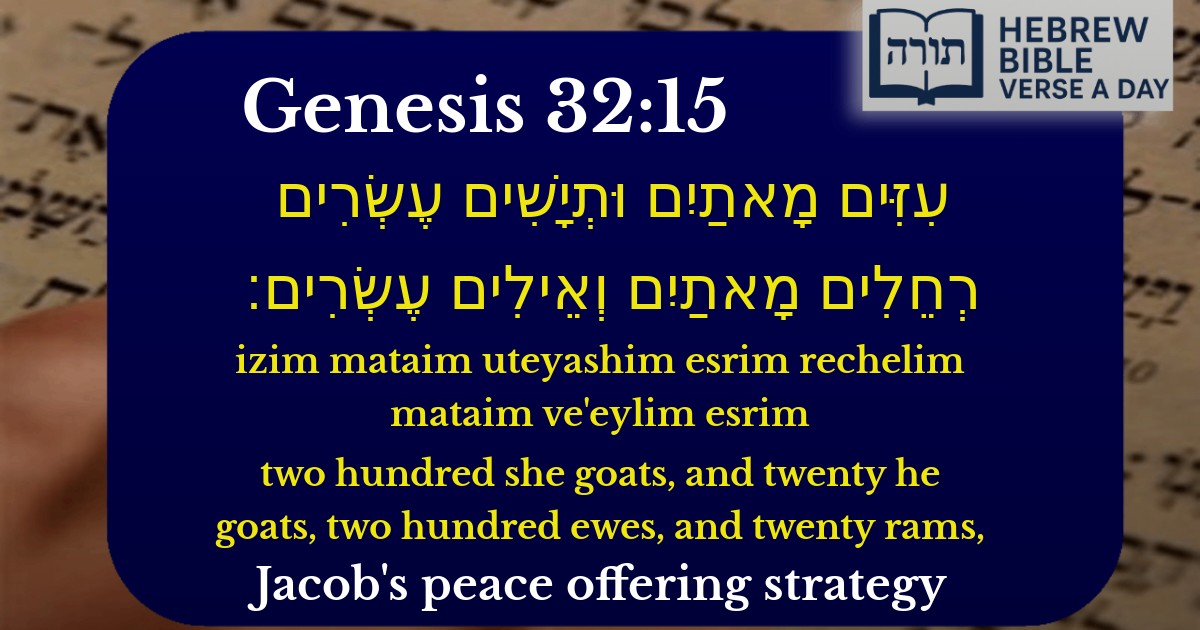Frequently Asked Questions
Q: Why did Yaakov (Jacob) send these specific animals as a gift to Esav (Esau)?
A: Yaakov sent these animals as a gift to appease Esav and seek reconciliation (Genesis 32:21). The selection of goats, ewes, and rams was significant because they were valuable livestock, demonstrating Yaakov's sincerity and willingness to make peace. Rashi explains that Yaakov chose animals that could reproduce quickly, showing his generosity.
Q: What is the significance of the numbers 200 and 20 in this verse?
A: The numbers 200 (for female goats and ewes) and 20 (for male goats and rams) represent a large and generous gift. The Midrash (Bereishit Rabbah 76:8) notes that Yaakov carefully selected these numbers to show respect and humility toward Esav, ensuring the gift was substantial enough to make an impact.
Q: How does this verse teach us about conflict resolution in Judaism?
A: This verse demonstrates the Jewish value of pursuing peace (דִּרְשׁוּ שָׁלוֹם). Yaakov took proactive steps to reconcile with Esav by sending a generous gift, showing that even when one is in the right, it is important to make efforts to mend relationships. The Rambam (Hilchot De'ot 6:9) teaches that seeking peace is a high priority in Jewish law.
Q: Why did Yaakov choose goats and sheep instead of other animals?
A: Goats and sheep were commonly used in ancient times for sacrifices, food, and trade, making them a valuable and practical gift. Additionally, the Talmud (Chullin 84a) notes that goats and sheep were considered clean animals (kosher) and thus appropriate for a respectful offering to Esav, who also followed the ways of their father Yitzchak (Isaac).
Q: Does this verse have any deeper spiritual meaning?
A: Some commentators suggest that the animals symbolize different aspects of Yaakov's life. The Zohar teaches that the 200 female goats and ewes represent abundance and blessing, while the 20 males signify leadership and strength. Yaakov was acknowledging that all his success came from Hashem and was willing to share it to achieve peace.


Context in the Torah
This verse appears in Bereishit (Genesis 32:15) as part of Yaakov Avinu's gift to his brother Esav, intended to appease him before their reunion. The detailed listing of livestock reflects Yaakov's careful strategy to demonstrate his goodwill and abundance.
Numerical Significance
Rashi (32:15) notes that the numbers—200 female goats and 20 males, 200 ewes and 20 rams—follow a consistent ratio of 10 females for every 1 male. This was a practical and generous gift, ensuring healthy breeding potential for Esav's flocks.
Symbolism of the Animals
Strategic Generosity
The Ramban (32:14-16) explains that Yaakov's gift was calculated to overwhelm Esav with its scale and quality, thereby softening his anger. The even distribution of males and females ensured the gift's long-term value, showing Yaakov's wisdom in conflict resolution.
Halachic Parallel
The Mishneh Torah (Hilchot Mechirah 1:12) later codifies that selling livestock in such ratios (10 females per male) is ideal for sustaining a flock, reflecting Yaakov's thoughtful approach as a model for fair dealings.